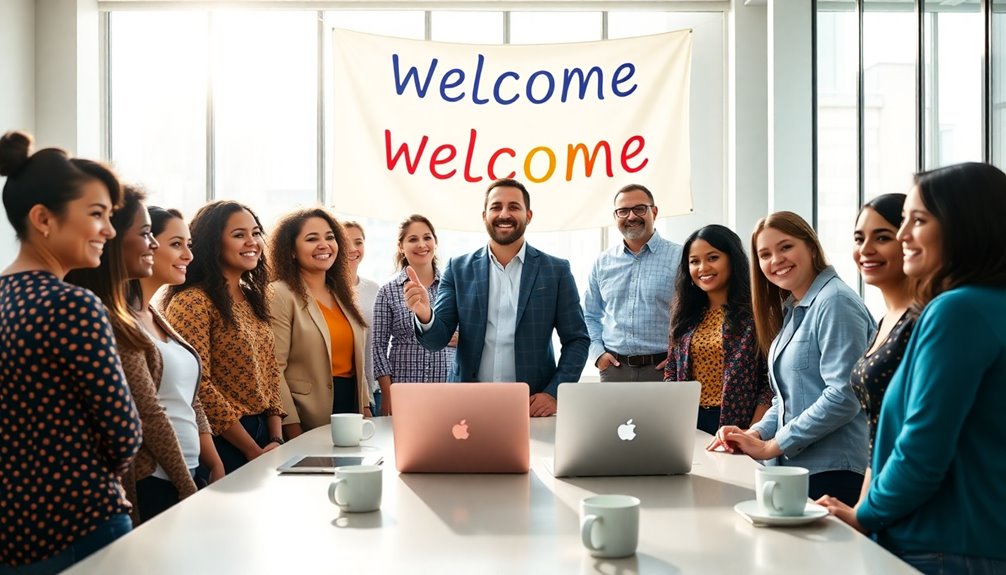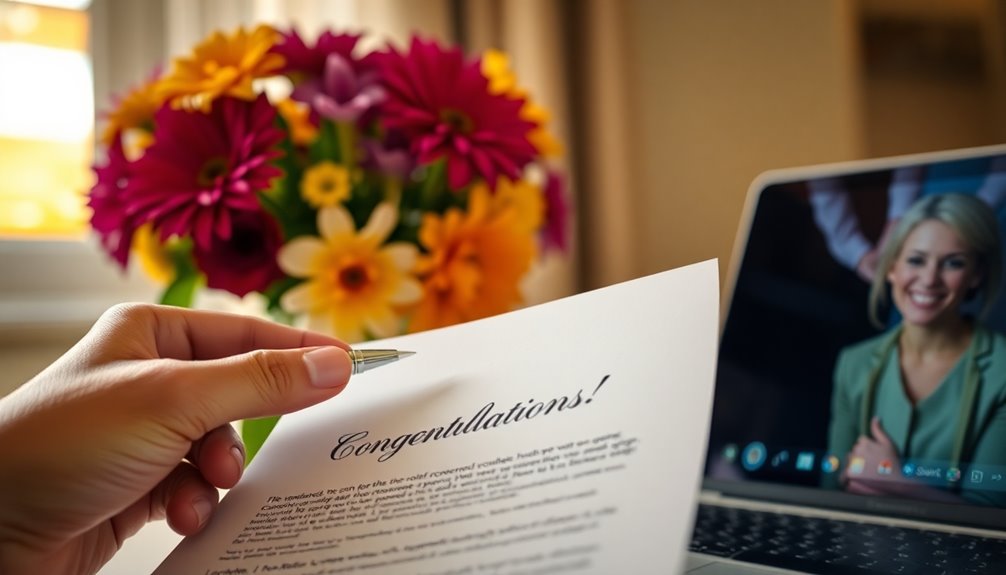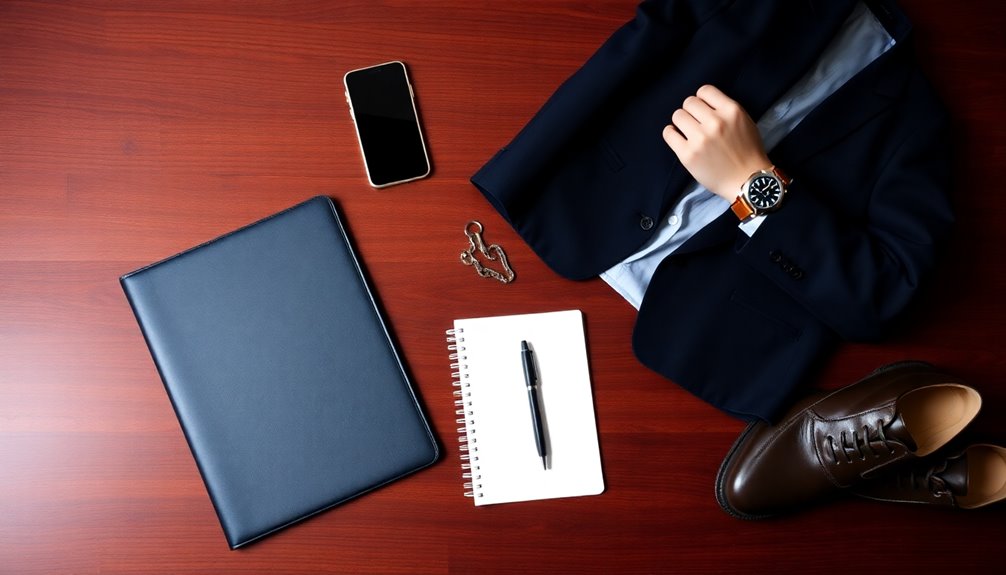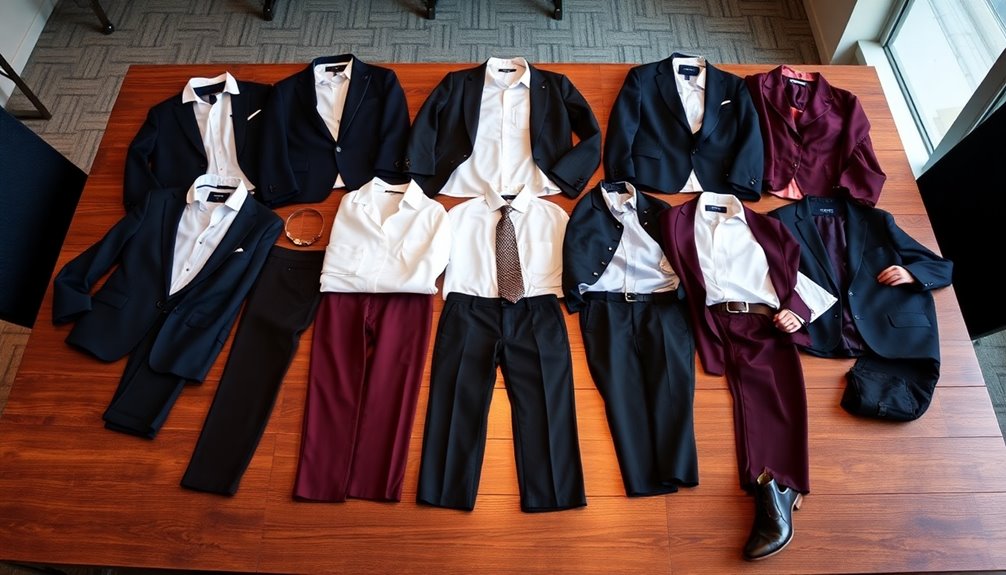You can tell you've landed the job when you notice positive body language from your interviewer, like smiling and nodding. If they use phrases like "when you start," that shows confidence in you as a fit. Engaging conversations about teamwork and cultural values suggest they see you as part of their team. Receiving compliments on your skills also hints at strong interest. If they discuss next steps or inquire about your availability, you're on the right track. There's more to explore about these signs and others that could indicate your success in the interview process.
Key Takeaways
- Positive body language from the interviewer, such as smiling and nodding, indicates strong engagement and interest in you as a candidate.
- Future-oriented language from the interviewer, using "when" instead of "if," suggests confidence in your fit for the role.
- Discussion about next steps or additional interviews signifies serious consideration of your application.
- Conversations about company culture and values indicate a focus on your compatibility with the team.
- Receiving direct compliments on your skills and experience reflects a favorable assessment of your qualifications.
Positive Body Language Indicators

When you walk into an interview, positive body language can greatly impact the impression you make. Smiling and nodding during the conversation shows that you're engaged and interested in what the interviewer is saying.
Maintaining eye contact not only suggests confidence but also conveys that you value their responses. An open posture, with your arms uncrossed and shoulders relaxed, reflects your receptiveness to information.
Leaning slightly forward can demonstrate attentiveness, signaling that you're keen to connect. Additionally, mirroring the interviewer's body language can create a sense of rapport, making you seem more relatable.
These subtle cues help establish a positive atmosphere, increasing your chances of leaving a lasting impression that could lead to a job offer.
Language Shifts to "When"

Making a strong impression in an interview goes beyond just body language; the language used by the interviewer can also signal their level of confidence in you. When they start using "when" instead of "if," it's a good sign.
Here are some phrases that indicate their confidence:
- "When you start" suggests they're envisioning your future with the company.
- "This is who you will" implies they see you as a strong fit for the role.
- Positive language reflects an optimistic outlook on your potential contributions.
- The shift to future-focused language creates a forward-looking atmosphere that bodes well for you.
Stay alert to these cues—they can reveal how seriously they're considering you for the position.
Engaging Casual Conversations

Casual conversations during an interview can reveal a lot about the rapport between you and the interviewer. When the tone shifts from formal questions to lighthearted topics, it often signals comfort and connection.
If the interviewer discusses personal interests or shares anecdotes, they're likely satisfied with your qualifications and want to know you better. This relaxed dialogue gives you a chance to showcase your personality, making a lasting impression.
Pay attention to their engagement—if they ask follow-up questions or share laughs, it's a good sign. Remember, these informal exchanges aren't just small talk; they indicate that the interviewer sees potential in you, leading to a more favorable outcome.
Embrace the moment and let your authentic self shine through.
Meeting Team Members

Meeting team members during an interview can be a pivotal moment that signals strong interest from the hiring manager. When you get introduced to potential colleagues, pay attention to the dynamics at play.
Here are some key signs that suggest a positive outcome:
- Multiple Introductions: Meeting several team members indicates the hiring manager's endorsement of your candidacy.
- Engaging Conversations: Positive interactions with team members show they see you as a good fit.
- Team Culture Insight: Getting a feel for workplace culture can hint at how you'd fit in.
- Future Collaborations: Discussions about projects you'd work on together imply they're envisioning you in the role.
These moments can reinforce your impression that you're a strong candidate for the job.
Receiving Positive Skill Feedback

Receiving positive feedback on your skills during an interview can greatly boost your confidence and reinforce your fit for the position.
When interviewers directly acknowledge your relevant skills, it signals a favorable assessment of your qualifications. You might hear phrases that highlight your experience or express a desire for specific skills, indicating they see you as a strong candidate.
Additionally, if they ask questions about ideal candidates, it shows they're gauging how well you align with their needs. This positive reinforcement enhances your confidence and clarifies how your qualifications match the job requirements.
Verbal Signs of Interest

Positive feedback on your skills often paves the way for other encouraging signs during the interview, particularly in the language used by interviewers.
You should pay attention to verbal cues that indicate their interest. Here are some key phrases to look for:
- Expressions of Interest: Phrases like "I was interested to learn" show their appreciation for your background.
- Impressed Reactions: Comments about being "impressed" suggest you're a strong candidate.
- Frequent Affirmations: Positive affirmations throughout the discussion can enhance your confidence.
- Curiosity About Experiences: Questions that reflect genuine curiosity about your past roles indicate engagement. Additionally, cybersecurity vulnerabilities may be a topic of discussion if your experience relates to tech roles, showcasing your relevance to current industry challenges. Being able to articulate your experiences also demonstrates your ability to reset and recover, which is a key trait employers often seek.
These verbal signs can create a supportive atmosphere, making it clear that you're being seriously considered for the position. Additionally, emotional disconnection can be avoided by ensuring ongoing communication and engagement after the interview. This ongoing dialogue mirrors the importance of professional help in navigating challenges that may arise in various aspects of life, including career and personal relationships.
Discussion of Job Perks

When the conversation shifts to job perks, it often signals a change from evaluation to genuine interest in you as a candidate. This is your chance to gauge how the company values its employees. If the interviewer spends time discussing benefits, it shows they're invested in you joining their team.
Here are some common perks you might encounter:
| Perk | Description | Why It Matters |
|---|---|---|
| Flexible Hours | Work when it suits you best | Promotes work-life balance |
| Professional Development | Opportunities for growth | Enhances career prospects |
| Health Benefits | Coverage for medical expenses | Supports overall well-being |
A thorough discussion about perks is a great sign that you've made a lasting impression! Additionally, companies that emphasize emotional well-being through their benefits are likely to foster a supportive work environment.
Conversations About Salary

Discussing salary expectations can feel intimidating, but it often signals that the employer is seriously considering you for the role. When the conversation turns to compensation, it's a good sign.
Here are four key indicators to look for:
- Direct Questions: If they ask about your salary expectations, it shows they're evaluating your fit for the budget.
- Market Value Discussion: Engaging in discussions about your worth indicates they're interested in you.
- Benefits Conversation: Talking about perks and benefits suggests they're keen on sealing the deal.
- Willingness to Negotiate: If they express flexibility, it shows they want to make it work with you.
Additionally, the overall tone of the conversation can reflect the employer's interest level and help you gauge how well you fit into the company culture.
These points can enhance your confidence in the hiring process.
Next Steps in the Process

How can you tell if an interview went well? If the interviewer discusses the next steps in the hiring process, it's a strong indicator of their interest in you. They might outline what to expect, like additional interviews or assessments.
If they ask about your availability or potential start date, that's a clear sign they're considering you seriously. You may also notice them referencing team dynamics or expressing excitement about your skills, which reflects their positive impression.
Engaging in conversation about onboarding logistics shows they're thinking ahead. Overall, clear communication about these next steps suggests they're invested in bringing you on board.
Exchange of Contact Information

Exchanging contact information at the end of an interview can signal a positive outcome. When interviewers share their details, it often means they're interested in staying connected with you. This exchange not only opens the door for follow-up questions but also suggests they see potential in you.
Here are some key points to reflect on:
- Cards or Numbers: Providing business cards shows a desire for future communication.
- Open Lines: A willingness to answer follow-up questions reflects ongoing engagement.
- Future Opportunities: Sharing contact details might lead to unexpected job prospects.
- Encouragement to Reach Out: If they invite you to get in touch, it indicates a positive impression.
These signs can boost your confidence and help you gauge your chances of landing the job.
Frequently Asked Questions
How Can I Prepare for a Job Interview Effectively?
To prepare for a job interview effectively, you should research the company and its culture.
Practice common interview questions, tailoring your answers to highlight your skills.
Dress appropriately to make a good first impression.
Bring copies of your resume and prepare questions to ask the interviewer.
Arriving early shows punctuality.
Finally, visualize success to boost your confidence.
With these steps, you'll feel ready and poised for the interview.
What Should I Wear to a Job Interview?
Choosing your outfit for a job interview is like painting a canvas; every detail matters. You should aim for professional attire that reflects the company's culture.
A tailored suit or a smart dress is often a safe bet. Make sure your clothes are clean and well-fitted.
Don't forget comfortable shoes, as confidence starts from the ground up. When in doubt, it's better to be slightly overdressed than underdressed.
Good luck!
How Long Does the Hiring Process Typically Take?
The hiring process typically takes anywhere from a few weeks to a couple of months.
It often depends on the company's size and the number of candidates. You should expect initial screenings, interviews, and possibly reference checks.
Staying patient is key, as they may also take time to finalize decisions.
If you haven't heard back after a couple of weeks, it's perfectly acceptable to follow up for updates.
What Are Common Interview Questions I Should Expect?
When you walk into an interview, expect questions that gauge your skills, experience, and cultural fit.
You'll answer inquiries about your strengths, challenges, and how you handle teamwork. You might discuss your previous roles, provide examples of problem-solving, and explain why you're interested in the position.
They'll likely ask about your long-term career goals and how you align with the company's values.
Be ready to showcase your unique qualities and passion!
How Should I Follow up After an Interview?
After your interview, it's important to follow up promptly.
Send a thank-you email within 24 hours, expressing gratitude for the opportunity and reiterating your interest in the position. Mention specific topics from the conversation to personalize your message.
If you haven't heard back within a week or two, don't hesitate to reach out again. This shows your enthusiasm and keeps you on their radar.
Stay professional and concise in your communication.
Conclusion
As you leave the interview, envision this: the interviewer leans back, smiles, and says, "I can see you fitting right in with the team." That's a strong signal you've impressed them! With each positive cue—like discussions about salary and job perks—you're one step closer to landing the job. Trust your instincts, stay confident, and remember those indicators. Embrace the excitement of what's next; your dream role could be just around the corner!









